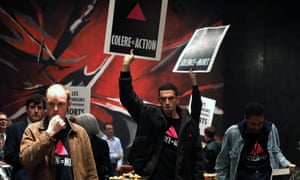LGBT people need to rediscover their rage in this age of protest
As the film 120 Beats per Minute shows, queer activism is at its best when it’s angry and combative – and there’s no shortage of causes to help
When director Robin Campillo won the prize for best film last month at France’s César awards, he used the opportunity to plead for the rights of French sex workers, drug users and migrants. The star of 120 Beats per Minute, Nahuel Pérez Biscayart, upon winning a César for most promising actor, spoke out on the subject of abortion rights in his home country of Argentina. This is all to say that the film, released in the UK last week, has politics coursing through its veins. In a time of great political division, its clarion call for protest and its questions about queer identity are perhaps more urgent than ever.
The film tells the story of a group of Parisian activists in the 1990s who form the French arm of the protest group ACT UP. Consisting of HIV and Aidssufferers and assorted queer folk, the collective takes radical action to remind society of the savage Aids epidemic that predominantly affected gay men, and to campaign for better laws and access to medication. The film underlines divisions between group members who are unsure about whether to be more radically queer and in-yer-face, or whether that belligerence undermines their efforts for recognition. What is unmistakable, however, is a vigour and excitement about the idea of protesting: there is a nostalgia for the concept of marching together, for the camaraderie of hatching plans. The film proposes homosexuality as a vibrant and questioning counterpoint to polite society; its protagonists are young, aware and angry. It could not be more burningly topical.
In late March, a young woman stood up in Washington DC and called out the names of her peers who had died in a school shooting, before descending into a long and powerful silence, as she stood at the lectern for the amount of time that it had taken for her classmates to be gunned down. Emma Gonzalez, the bisexual Cuban-American woman spearheading the March For Our Lives movement, has talked about the way her LGBTQ activism and her work against gun violence are related: it seems clear that her outsiderness is key to her stance. In being outspoken, Gonzalez has been attacked by Republicans such as Steve King, a congressman with a history of making homophobic statements.
Members of ACT UP and Gays Against Guns could also be found protesting at the anti-gun marches in the US. Today’s generation of young people demanding change, including Black Lives Matter protesters fighting state violence, is of a piece with 120 Beats per Minute’s activists – right down to their witty, irreverent responses to the establishment. The film’s generational clash between out gay activists and a homophobic society finds an easy parallel in a dispossessed generation of millennials fighting ideological battles today.
Equally, the film asks where queer people can go next. It comes at a time when queer cinema has become less niche and less confrontational: from God’s Own Country to Call Me By Your Name, to Love, Simon, the new gay theme is one of acceptance of homosexual people by their straight families. Coupled with the return of the appalling minstrelsy of Queer Eye, we are seeing a more emollient culture, one aimed at happy and accepted gay people who are sick of anguished depictions of suffering victims. But we need to rekindle some of our abrasiveness. 120 Beats per Minute doesn’t plead for heterosexual patronage, because straightness is not a part of that world. Its register, while combative, is joyous and celebratory, giving us something with fire in its belly, and which calls for queers to rediscover our radicalism and fight not for integration so much as acceptance of our difference.
There is still much to fight for. We have a Tory government riddled with homophobia, outing a young whistleblower in a statement sanctioned by Downing Street, and forming a coalition deal with the Democratic Unionist party. From Andrea Leadsom and Jacob Rees-Mogg flaunting their opposition to equal marriage to David Davies expressing transphobic views, the ruling party isn’t often shy about its disregard for the queer community.
Taking a page from 120 Beats per Minute’s generosity of spirit and universalism, all queers should make a point of standing with our trans siblings, attacked every day in our streets and press, and the Muslim community, often the object of ignorant vilification in our name. Access to the HIV medication PrEP should be made readily available on the NHS. Queer people are over-represented among Britain’s growing homeless population. And that’s just in Britain; the rest of the world deserves our attention too.
120 Beats per Minute posits queerness as open and generous – turning outwards rather than in on itself, to other marginalised communities, in empathy, solidarity and riotous communion. The righteous outrage it displays, and its passionate call to arms, will always be salutary to the LGBTQ movement, and always topical.
• Caspar Salmon is a film writer based in London


No comments:
Post a Comment